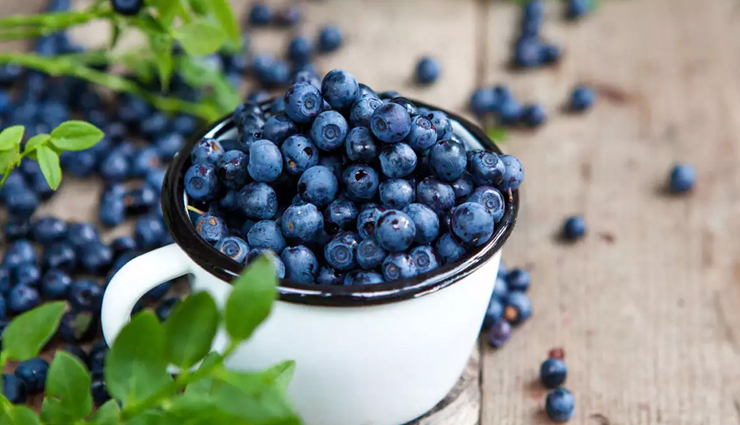- Home›
- Healthy Living›
- 6 Health Benefits Of Consuming Blueberries
6 Health Benefits Of Consuming Blueberries
By: Priyanka Maheshwari Fri, 23 Sept 2022 12:18:32

Featuring in smoothie bowls, oatmeal, muffins, cookies, sandwiches, and even pies, blueberries are every food enthusiast’s delight. And if their deliciousness and versatility don’t drive you to your nearest grocery store, then their nutritional quality will. So we’ve put together a list of health benefits that come with a handful of these humble berries.

# Lowers Blood Pressure
Individuals with high blood pressure would benefit from snacking on a handful of blueberries every now and then. Diets that are low in nutrients like potassium, calcium, and magnesium (which are found in blueberries) have been found to increase blood pressure. Regular consumption of blueberries, hence, can aid in meeting the daily dietary requirement and managing blood pressure levels.
In line with this, studies have found that consuming 50 grams of blueberries every day can lead to a 4–6% reduction in blood pressure in obese individuals. Similar results were found in post-menopausal women. This, in turn, prevents arterial stiffness and the risk of cardiovascular disease.

# Promotes Heart Health
With heart disease being the leading cause of death in the world, loading up on foods that keep the disorder away is wise, especially if you have a history of it in your family. Besides the fact that blueberries lower blood pressure, a major risk factor for heart disease, studies have found that flavonoid-rich foods, like blueberries, improved general heart health. The B vitamins found in blueberries, in particular, prevent the buildup of homocysteine, an amino acid in the blood, whose buildup is linked to damaged blood vessels and heart problems.
In addition to this, blueberries may also inhibit the oxidation of LDL cholesterol, a process in which LDL cholesterol particles in the body react with free radicals (unstable molecules that are products of metabolism, a disease, or exposure to toxins). LDL oxidation increases the risk of and is often the first step in the progression of, coronary heart disease. One study found that young and middle-aged women who had a higher intake of anthocyanins, water-soluble pigments that give blueberries their color, had a 32% lowered risk of heart attacks. That said, considering the fact that the study was observational, it can’t be determined for certain whether the anthocyanins alone reduced this risk.

# Improves Brain Function And Health
Blueberries can be a fun and delicious way to give your brain function a boost. Here are a few aspects of cognition and brain functioning that they benefit:
- Memory
Blueberries fight age-related decline in memory. In fact, studies have found that blueberry consumption has a noticeable impact on short-term memory and improves long-term reference memory after just eight weeks of supplementation. Subjects of most of these studies were older adults with early memory decline and an increased risk of dementia. In addition to this, even on a short-term consumption basis, the blueberry-enriched diet prevented and reversed object recognition memory loss in aging rats. Besides this, high intake of polyphenol, an antioxidant found in blueberries, is also linked to better language and verbal memory as well as learning. As a result, the superfruit may also fight and prevent Alzheimer’s disease by improving memory, improving access to words and concepts along with boosting cognitive performance and brain function.
- Decision making
If you’ve been growing more indecisive with each passing year, blueberries might help. Studies have found that rats that rats fed with a two percent blueberry diet for three weeks took less time in decision making when presented with a choice than the ones who weren’t.
- Motor function and spatial memory
Blueberries can enhance your sense of navigation and direction. If research is to be believed, the phytochemicals and flavonoids in foods like blueberries help in reversing age-related deficits in motor function and spatial working memory. In an animal study, scientists demonstrated that aged rats fed with a two percent blueberry diet for three weeks exhibited a marked improvement in spatial working memory.

# Maintains Bone Health
Blueberries contain nutrients like iron, phosphorous, calcium, magnesium, and zinc which are required to build and maintain bone structure and strength. They also contain iron and zinc which play a crucial role in maintaining the strength, integrity, and elasticity of bones and joints.
In addition to this, blueberries also contain calcium, which is vital for bone strength. The vitamin K in these berries improve calcium absorption and prevent bone fractures.

# Improves Skin Health And Prevents Skin Aging
The vitamin C in blueberries stimulates collagen synthesis. And since collagen is the support system of the skin, consuming enough of the vitamin can reduce skin damage caused by the sun, pollution, and smoke. In addition to this, it may also improve collagen’s ability to smooth wrinkles and improve skin texture.
In addition to this, resveratrol found in dark colored foods, such as blueberries, may help slow down the signs of aging on the body and skin. Some evidence suggests that it may also be able to help prevent skin cancer formation. However, further research is required to fully confirm this.

# May Aid In The Management Of Diabetes
Blueberries pack in a lot of fiber, 3.6 cups per cup to be precise, which has been linked to low blood glucose levels in people with type 1 diabetes. In type 2 diabetics, it can improve blood sugar, lipid, and insulin levels. In addition to this, one large study found that consuming 3 servings per week of blueberries reduced the risk of type 2 diabetes by 7 percent.





